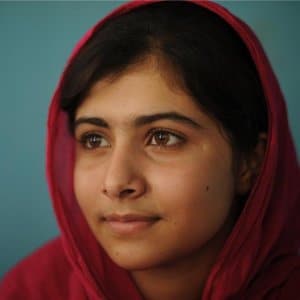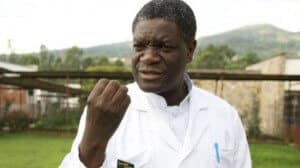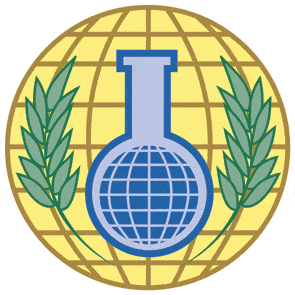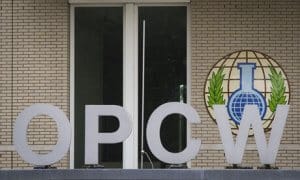So you’re you, yes? A person of conservative or traditional or simply unloony views walking your campus with your head in...
Making Statues of Committees
I found this article by MSN UK News, to be representative of several articles that I have read about the 2013 Nobel Peace Prize.
Let’s take a look. First, it’s authored by “MSN UK News.” So, the author is anonymous.
Next, the writer consistently uses the passive voice.
The Nobel Peace Prize for 2013 has been awarded to the Organisation for the Prohibition of Chemical Weapons.
The organization is described using its acronym “OPCW.” The author does not mention any of the persons who compose this organization by name. The author does not even attribute responsibility or praise to the leader of the organization, Director-General Ahmet Uzumcu.
Instead, the author attributes actions to the abstraction of the OPCW as a whole, without any glimpse into the actual existence—let alone activities—of the 500 persons who are employed there.
Here are some more examples of the author writing in vague abstractions:
- The OPCW is currently overseeing…
- the organisation plays a key role…
- The conventions and the work of the OPCW have defined the use of chemical weapons…
- The organisation has a working relationship…
- The 1993 Chemical Weapons Convention has contributed…
Lest you think the abstractions and generalities are reserved to protect the identities of so many secretly working for global safety, consider the fact that even the press release of the Nobel Committee is not signed by anyone. Anonymous journalists are reporting that the Nobel Committee said it was awarding the honour to the OPCW ‘for its extensive efforts to eliminate chemical weapons’ because, after all, “The Norwegian Nobel Committee has decided that the Nobel Peace Prize for 2013 is to be awarded to the[m].”
In many articles about the 2013 Nobel Peace Prize, the only names mentioned by anonymous journalists are those of the runners-up:
Pakistani schoolgirl campaigner Malala Yousafzai and gynaecologist Denis Mukwege of the Democratic Republic of Congo had been among the favourites to take the award.
Well, duh. Of course Malala and Denis were among the favorites. They’re actual persons.



Know what? Prizes should be awarded to persons who act in the world and who appear to others in public.
Alfred Nobel, who started the prize, wrote in his will in 1895:
The said interest shall be divided into five equal parts, which shall be apportioned as follows: […] one part to the person who shall have done the most or the best work for fraternity between nations, the abolition or reduction of standing armies and for the holding and promotion of peace congresses.
But Alfred Nobel is dead. He cannot exercise his own judgment now and award anyone he likes for promoting fraternity, statesmanship, or peace. He tried to delegate a task requiring responsibility and judgment to committees of functionaries and we are witnessing the limits and the consequences of this.
As bureaucratic organizations become an increasing feature of our modern lives, let’s be sensitive to this. Hannah Arendt argues:
The essence of totalitarian government, and perhaps the nature of every bureaucracy, is to make functionaries and mere cogs in the administrative machinery out of men, and thus to dehumanize them. And one can debate long and profitably on the rule of Nobody, which is what the political form known as bureaucracy truly is….we have become very much accustomed by modern psychology and sociology, not to speak of modern bureaucracy, to explaining away the responsibility of the doer for his deed in terms of this or that kind of determinism.
Mainly, I’ve been hating on the Peace Prize in particular. The Peace category is the only one for which which organizations have been named winners. The Nobel Laureates for Physics, Chemistry, Physiology/Medicine, and Literature have all been awarded to individual persons. I think this makes the most sense. It is good to publicly celebrate the achievements of those who make such extraordinary contributions in the world. And it is helpful that a particular old, dead, rich, white male decided to allocate his fortune posthumously to these ends.
As soon as I read that a committee (the Nobel Committee) awarded a prize to another committee (the Organisation for the Prohibition of Chemical Weapons), I remembered this quotation by G.K. Chesterton:
I’ve searched all the parks in all the cities and found no statues of committees.
But now, with Peace Prizes going to committees, is it really that difficult for us to imagine making statues out of them?

Get the Collegiate Experience You Hunger For
Your time at college is too important to get a shallow education in which viewpoints are shut out and rigorous discussion is shut down.
Explore intellectual conservatism
Join a vibrant community of students and scholars
Defend your principles
Join the ISI community. Membership is free.
J.D. Vance on our Civilizational Crisis
J.D. Vance, venture capitalist and author of Hillbilly Elegy, speaks on the American Dream and our Civilizational Crisis....
